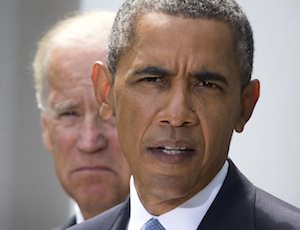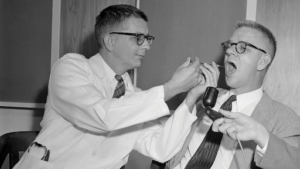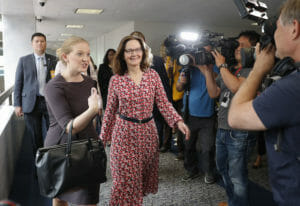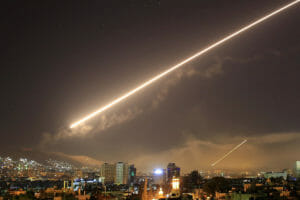Truthdiggers of the Week: Skeptics of Obama’s Syrian Weapons Claims
This week we honor those who retain their commitment to truth in the face of easy answers, incomplete reporting and official misinformation, such as former Rep. Dennis Kucinich.Amid lingering but narrowing uncertainty about what happened in Ghouta, we honor those who remain skeptical of power in all its forms and sympathetic to the welfare of others.
Every week the Truthdig editorial staff selects a Truthdigger of the Week, a group or person worthy of recognition for speaking truth to power, breaking the story or blowing the whistle. It is not a lifetime achievement award. Rather, we’re looking for newsmakers whose actions in a given week are worth celebrating. Nominate our next Truthdigger here.
Whom to believe? That’s the question demanded by prudence and intellectual integrity in any effort to learn what happened a week and a half ago in the Ghouta suburb of Damascus. President Obama says it was Bashar al-Assad who gruesomely killed hundreds of Syrian civilians and injured thousands more in the rebel-held area with lethal gas and that a “limited” act of war in response is necessary. He says he has the evidence to prove Assad’s guilt, but he refuses to share it with the public.
Americans spent the entire summer discovering how little obligation their president feels to keeping his fellow citizens informed about the scale, reach, methods and objectives of his digital spying operations. Secrecy from officials is nothing new, but technological advances and decades of erosion of “liberty and justice for all” have created new opportunities to abuse the privileges of public office. Americans now depend almost exclusively on outlaw whistle-blowers such as Edward Snowden and Chelsea (formerly Bradley) Manning and the journalists with whom they work just to get a vague sense of what their leaders are really doing.
The administration’s treatment of the Ghouta tragedy does more to reveal Obama’s disregard for the Constitution and democratic due process and suggest concealed motives than it tells us what happened there. It was only four days into an investigation of the site by U.N. weapons inspectors that Secretary of State John Kerry pronounced Assad’s regime undeniably responsible for the attack. The official assessment Kerry referred to as support for this claim contained no hard evidence of official involvement in the attack. In lieu of such evidence, the report’s authors four times embedded the phrase “high confidence” within vague references to circumstantial evidence, such as the Syrian government’s known possession of chemical weapons, and the movements and communications of its military at the time of the attack. Additionally, the phrase “we assess” was included nine times to prepare readers for variations of the claims that the opposition is incapable of using chemical weapons and that only the Syrian military could have executed the attack. Absent the release of the alleged evidence, these claims are left to serve as their own proof. (Tellingly, one or more of the report’s authors did think it prudent to admit that their corroborations fell “short of confirmation,” a phrase that appeared once.)
Do these omissions mean that Assad did not kill his fellow Syrians with rockets laden with indiscriminate poison gas? No. But according to critics, there are glaring and suspicious omissions in Obama and Kerry’s official account. To begin with, in a letter published on Truthdig on Friday, former Rep. Dennis Kucinich describes some number of the electronic communications between Syrian military officials that Kerry claims his allied intelligence services gathered — some or all of which appear to have come from Israel — as finding the Syrian officials “denying they initiated an attack,” apparently rather than making statements that indicate they committed one.
Another complication named by Kucinich (and supported elsewhere) includes references to at least two instances in which the Syrian opposition is believed by credible figures to have used chemical weapons. One instance reported by Voice of America — the United States’ international propaganda broadcast network — says Russia’s U.N. ambassador gave the United Nations 80 pages of documentation building a case that Syrian rebels used such weapons in one of the country’s northern provinces in March. The official is quoted as saying Russian scientists concluded from an examination of samples taken from the alleged attack site that the weapon used “was not industrially manufactured and was filled with sarin,” which was also determined not to have been made professionally. “Therefore,” said the ambassador, “there is every reason to believe that it was the armed opposition fighters who used chemical weapons” in the attack. He said at the time that he would send what the experts uncovered to his Western counterparts. Britain, France and the United States subsequently said — as Kerry maintained Friday — that they have no evidence that Syrian rebels ever used chemical weapons.
The second suspected use of chemical agents by rebels cited by Kucinich occurred in April and was regarded by U.N. special investigator Carla Del Ponte as credible.
Kucinich also refers to reports describing rockets recovered from near the Ghouta attack site as “homemade,” a label that runs against the sleek professionalism of a modern military. These reports may be hard to confirm. The Wall Street Journal reported Tuesday that high-ranking American officials formally requested that the U.N. abandon its examination of the attack site, saying the U.S. already had conclusive evidence showing the Syrian government’s culpability in the attacks. This discouragement is odd coming from officials hoping to make a case for an assault on Syria, which is reasonable to suspect U.S. leaders were planning to do at the time. If military action is warranted, then why not have supporting evidence from outside parties?
Late on Thursday, the underground quarters of the Internet caught fire with what claimed to be a previously unreported perspective of the gas attacks. An article published on the independent news site MintPress News, written by a freelance Associated Press, NPR and BBC reporter, cited alleged interviews with “doctors, Ghouta residents, rebel fighters and their families” that suggested the attack may have been accidental and originated with chemicals given to local rebels by Saudi Arabian intelligence chief Prince Bandar bin Sultan. (As of Sunday morning, it appears no major news outlets picked up this story. One expert I contacted described the report as “dubious.” I will update this article with an explanation from one of them as soon as I receive it. Update: Thanks for waiting for this clarification. Unfortunately, no one who expressed doubt about the MintPress News report was more specific with their criticism.)Truthdig Editor-in-Chief Robert Scheer this week described bin Sultan as “the most effective Machiavellian politician of the modern era” and “the main source of arms for pro-al-Qaida insurgents in Syria.” That bin Sultan and the Saudis are among of the chief foreign promoters of the Syrian opposition is beyond question. But whether bin Sultan would even be capable of transporting chemical weapons across the Syrian border in a quantity corresponding to last month’s attack seems doubtful. The head spy is known to have become cozy with the Washington establishment during 20 years of service as a Saudi ambassador to the U.S., and The Independent reports that it was his agents who first alerted “Western allies to the alleged use of sarin gas by the Syrian regime in February.” Members of the C.I.A. are said to have cheered when it was announced that bin Sultan was installed as the head of Saudi Arabian intelligence, taking from the appointment that the country was “serious” about toppling Assad. Bin Sultan, they anticipated, “could deliver what the CIA couldn’t: planeloads of money and arms, and, as one U.S. diplomat put it, wasta, Arabic for under-the-table clout.” And given the complicatedness of Middle Eastern political relationships, it’s not just Assad that bin Sultan is after. He is also targeting, at least, Lebanon’s Hezbollah and Iran, both of which are obstacles to the political and economic interests in the Middle East of the historical and current American leadership. Robert Fisk at The Independent went as far as to say an American assault on Syria would act as a stealth attack on Iran.
The Telegraph this week offered a grim portrait of bin Sultan’s negotiating style. Leaked transcripts of talks that took place with Russian President Vladimir Putin last month reportedly show the “Machiavellian” Saudi mixing threats and incentives, offering protection from Chechen terrorists under Saudi Arabian control during the upcoming Winter Olympics as well as cheap access to Saudi Arabian oil. The deal would be made in exchange for Putin easing off his support for Assad in Syria. Bin Sultan depicted the Chechens as active among the Syrian opposition as entirely under Saudi Arabian control and able to be called off on command.
The Independent correspondent Patrick Cockburn, who began covering Syria in the 1970s, has made it clear that U.S. leaders like a Syria preoccupied with civil war. This means the Syrian government can’t effectively oppose American policies. It also means that Hezbollah is largely too distracted and spread out to attack Israel. Four days after the chemical attack, Cockburn offered a simple and obvious framing that begged a satisfying answer to the question of why Assad would gas the Ghoutans. “The priority for Syrian foreign policy for the past two-and-a-half years has been to avoid foreign military intervention on behalf of the rebels,” he wrote. “By the same token, the opposition has tried by every means to secure armed intervention by the US and its allies sufficient to win the war.” A chemical attack by any means could make intervention to the apparent benefit of the opposition by a U.S. looking to thumb its nose at Assad more likely.
But the mere fact that there are holes in the evidence is not proof of Assad’s innocence, especially so early in the reporting of events. “Unsurprisingly,” Cockburn wrote in a piece published Sept. 1, “people who feel they were swindled into war 10 years ago by bloodcurdling accounts of Saddam Hussein’s non-existent weapons of mass destruction are dubious about their government’s claim that President Bashar al-Assad’s army used poison gas on a mass scale on 21 August. All the questions that should have been asked in 2003 about Iraq are being asked about Syria: what is the evidence for chemical weapons? How partial are the sources of information? Why should Assad do something so much against his own interests? Would a limited air assault on Syrian military bases deter him from using chemical weapons again, supposing he used them this time, or would it be the first step towards ever-deeper British and American involvement in the war?”
“All these are reasonable questions and many of them have reasonable answers,” Cockburn continued. “Unlike Iraq, it is known that the Syrian army has large supplies of chemical weapons such as sarin and that a mass attack took place. A hundred videos show the dead and dying. Doctors diagnosed the symptoms of gas poisoning. It is highly unlikely that the opposition had enough chemical weapons to simulate a government attack in order to provoke foreign intervention.”
Elsewhere Cockburn confirmed that just because it would be against the interests of Assad or a Syrian military faction to use chemical weapons does not mean it didn’t happen. “Governments and armies do stupid things,” he wrote.
Critics of Obama’s plan to bomb Syria seem to be unanimous in the belief that an attack would destabilize the region more than it already is, potentially bringing Russia and other Syrian allies into a protracted multinational war. They agree it wouldn’t be as quick and easy as the 2011 intervention in Libya, a country that had few allies and was led by a dictator who was clearly on his way out. Another long war would be a dream for the U.S.’ already grotesquely bloated and predatory military-industrial complex. But it would be disastrous for the world Obama claims he wants to keep safe, including the Syrians he says his assault would be intended to protect. The president’s expressed disinterest in ousting Assad seems at odds with his peace and protection story too.
There has not been a complete accounting of the reports and criticisms shedding light on the circumstances surrounding the horror in Ghouta, or the appropriate responses, or the possible motivations of all parties involved. It is too early for that. Additionally, as Patrick Cockburn told me during a conversation on the challenges of covering the Syrian civil war in July, we are faced with the fact that the quality of coverage of places like Syria has “gone down” in recent years — no doubt in large part because of the slashing of foreign staff by major newspapers. If those offices remained in their previous size, there might have been fewer questions about the responsibility of last month’s chemical attacks, and a smaller probability of what Fisk called “the stupidest Western war in the history of the modern world.”
What I can say beyond a doubt is that we at Truthdig admire people worldwide and at every level of society who retain their commitment to truth in the face of easy answers, uncomfortable ambiguity, incomplete reporting, official misinformation and greasy moral pronouncements from governments that lost the mandate to make them over decades of military aggression. We value those who resist the temptation to throw uncritical support behind leaders who present themselves as champions of the helpless — of people whose suffering at the hands of their leaders represents a convenient geopolitical opportunity. We also admire reporters, critics and politicians who act as checks against these inclinations in others.
Amid lingering but narrowing uncertainty about what happened in Ghouta, we honor those who remain skeptical of power in all its forms and sympathetic to the welfare of others as our Truthdiggers of the Week.
Your support matters…Independent journalism is under threat and overshadowed by heavily funded mainstream media.
You can help level the playing field. Become a member.
Your tax-deductible contribution keeps us digging beneath the headlines to give you thought-provoking, investigative reporting and analysis that unearths what's really happening- without compromise.
Give today to support our courageous, independent journalists.





You need to be a supporter to comment.
There are currently no responses to this article.
Be the first to respond.